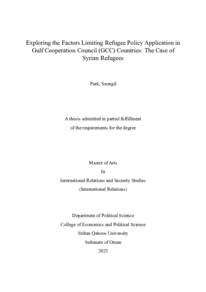Document
Exploring the factors limiting refugee policy application in Gulf Cooperation Council (GCC) Countries : the case of Syrian Refugees.
Publisher
Sultan Qaboos University.
Gregorian
2023
Language
English
Subject
English abstract
The Syrian civil war in 2011 caused a massive refugee crisis, with millions of Syrians fleeing
their homes. The response of the Gulf Cooperation Council (GCC) to Syrian refugees has been
a topic of intense academic and political debate. Despite providing significant humanitarian
financial support during the Syrian civil war, GCC countries were criticized in 2015 for not
actively accepting Syrian refugees. This study aims to demonstrate the factors that GCC
countries limit in accepting Syrian refugees. A case study approach using qualitative research
methods was employed, with data collected from structured interviews and secondary research.
The structured interviews aimed to prospect refugee policies in GCC countries. GCC countries
have a long history of accepting refugees since the 1950s, and foreign workers' migration has
emerged as a significant social phenomenon. The factors that influence refugee policies in GCC
countries were analyzed by considering the experiences of refugee and labor migration in the
region. Most refugees in the Middle East are caused by civil wars or war and possess political
characteristics. The study identified two factors influencing the GCC countries' refugee policies.
The first is the long-standing competition and conflict between Saudi Arabia and Iran in the
region, which GCC states view as a threat. Second, the high proportion of foreign migrant
workers in GCC societies has become a social problem, and policymakers do not want to
increase this proportion by accepting refugees. The study suggests that GCC countries will
continue to provide financial contributions to refugees in foreign countries and will not change
their policies to accommodate refugees in the short term. However, they are expected to
actively participate in humanitarian aid and national reconstruction for Syria once the civil war
ends.
Member of
Resource URL
Arabic abstract
تسببت الحرب الاهلية السورية في عام 2011 في أزمة الجئين هائلة، حيث فر ملايين السوريين من منازلهم. فكانت استجابة دول مجلس التعاون الخليجي للاجئين السوريين موضوع نقاش أكاديمي وسياسي مكثف. وعلى الرغم من تقديم مساعدات إنسانية كبيرة ودعم مالي خالل الحرب الاهلية السورية، تعرضت دول مجلس التعاون الخليجي لانتقادات في عام 2015 لعدم قيامها بقبول اللاجئين السوريين بشكل نشط. تهدف هذه الدراسة إلى توضيح العوامل التي تحد دول مجلس التعاون الخليجي من قبول اللاجئين السوريين حيث تبعت هنهج دراسة الحالة باستخدام البحث النوعي وتم تجميع البيانات من المقابلات المنظمة والبحوث الثانوية. هدفت المقابلات المنظمة في هذه الدراسةإلى توقع سياسات اللاجئين المستقبلية في دول مجلس التعاون الخليجي حيث ان دول مجلس التعاون الخليجي لديها تاريخ طويل في قبول اللاجئين منذ الخمسينيات، وكذلك هجرة العمال الاجانب فغدت الهجرة ظاهرة اجتماعية مهمة في هذه المنطقة. تم تحليل العوامل التي تؤثر على سياسات اللاجئين في دول مجلس التعاون الخليجي من خلال النظر في تجارب اللاجئين وهجرة العمالة في المنطقة. فمعظم اللاجئين في الشرق الاوسط سببهم الحروب الاهلية أو الحروب التي تمتلك خصائص سياسية. حددت الدراسة عاملين يؤثران على سياسات اللاجئين في دول مجلس التعاون الخليجي ,اوال: التنافس الطويل الامد والصراع بين المملكة العربية السعوديةوإيران في المنطقة التي تعتبرها دول مجلس التعاون الخليجي تهديًدا. وثانيا:ً ارتفاع نسبة الاجانب حيث أصبح العمال المهاجرون في مجتمعات دول مجلس التعاون الخليجي مشكلة اجتماعية، وال يريد صناع القرار زيادة هذه النسبة بقبول اللاجئين. وتشير الدراسة إلى أن دول مجلس التعاون الخليجي سوف تستمر في تقديم المساهمات المالية للاجئين في الدول الاجنبية ولن تتغير سياساتهم لاستيعاب اللاجئين على المدى القصير. ومع ذلك، من المتوقع المشاركة الفاعلة في المساعدات الانسانية وإعادة الاعمار الوطني لسوريا بمجرد انتهاء الحرب الاهلية.
Category
Theses and Dissertations

